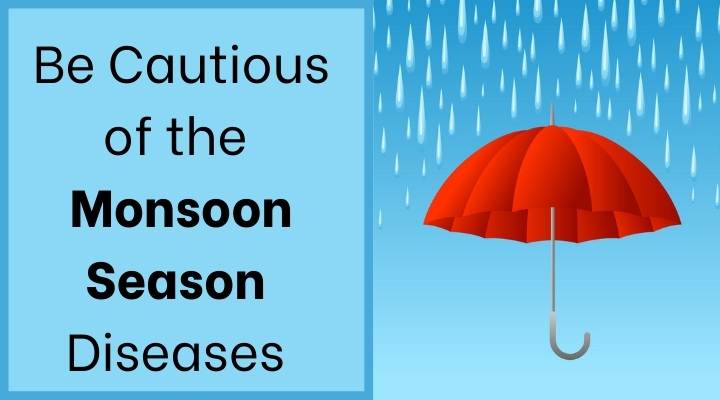It’s that time of the year, where the onset of monsoons brings in a whirlwind of emotions as well as diseases. While monsoons have been an inspiration for poets and singers, a beacon of hope for the farmers and of course romanticised through cinema for decades, it also has brought our attention to overall wellness. This is the best time to put ‘prevention is better than cure’ into action.
The unprecedented times of the pandemic have stressed enough that we need to start taking course of our health and well-being. With covid back at its peak again, kids and senior citizens are easily prone to a lot of viral and fungal diseases in this rainy season. Common of them include dry cough, cold, flu, respiratory disorders, viral infections, conjunctivitis, digestive problems, ulcers, joint pains, and fatigue.
Monsoon comes with humidity and an environment that may promote growth of microorganisms and put one at risk of developing various health ailments. From seasonal cough and cold to stomach infections, from mosquito-borne diseases to liver inflammation- are all signs of monsoon onset diseases. Hence, monsoons are the busiest time of the year for doctors.
Commonly spread diseases during monsoons:
Personal cleanliness and hygienic surroundings are extremely important in the rainy season. Micro-organisms survive in the water stoked in plant pots, or water tanks. Before the onset of the monsoon season, the elderly should keep their surroundings dry and clean. Multiple air-borne, food-borne, water-borne, mosquito-borne and several fungal infections are prone to happen this monsoon.
1. MOSQUITO-BORNE DISEASES:
Monsoons are the breeding season for mosquitoes and mosquito-borne diseases. The malaria causing mosquito breeds in water channels and streams. The illness presents as intermittent, high fever typically accompanied by chills, for several days. In severe forms, it may present as cerebral malaria – affecting the brain and even leading to coma. Dengue causing mosquitos breed in stagnant water and the symptoms include high fever, back ache, generalized weakness and muscle pain. In severe cases, there could be increased chances of bleeding due to low platelet counts. Chikungunya, another mosquito borne viral disease causes pain in the joints and bones along with fever. Precautionary measures include:
- Use mosquito nets in your house – on the windows or around the beds
- Wear full length clothes and cover your body while stepping out
- Don’t allow water to stagnate or collect anywhere in and around the house
- Maintain hygiene and wash your bathrooms regularly
- Use mosquito repellants/creams
2. WATER-BORNE DISEASES:
A hot and humid climate promotes the growth of bacteria in the food. At the same time, sources of drinking water get contaminated by flooding and overflowing of rivers. Walking through flooding areas also exposes you to various organisms that come in direct contact with your body. The most common water-borne diseases are jaundice, typhoid and other gastro-intestinal infections. Diseases like these can be prevented through:
- Always boil water and wash fruits and vegetables thoroughly before consumption
- Keep your foods covered at all times and avoid consumption of outside food
- Ensure personal and environmental hygiene is maintained at all times (carry a hand sanitizer or wash your hands often)
- Ensure open drains and potholes in your locality are covered.
- In case you have suffered a cut or bruise, ensure you keep it covered before stepping out of your home.
- Get your children vaccinated if they are not already
3. AIR-BORNE DISEASES:
The common flu, viral fever, cold, cough, and sore throat are just a few of the airborne infections that the monsoon season brings with it. These infections are spread by disease-causing viruses through the air. The most prevalent illnesses transmitted by air are common cold, influenza and covid. All these can be prevented through the following:
- Cover your mouth and nose while coughing or sneezing
- Keep your children away from people who are already infected and ensure they wash their hands and feet thoroughly once home from outdoors
- Ensure your homes are well- ventilated at all times
- Vaccinate against covid and influenza
- Persons with weak immune system like cancer patients, immunocompromised, pregnant women and children are more prone to infections during this season. They must take care and use masks when necessary.
Planning for monsoons in the right way:
Although eating properly and maintaining good hygiene can be very helpful in keeping you safe during the rainy season, you cannot completely avoid getting sick. In particular, monsoons, paired with the current state of COVID, can cause serious problems. Therefore, you need to take additional steps to protect your health and be prepared for any difficulties.
